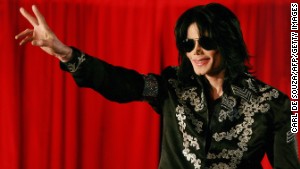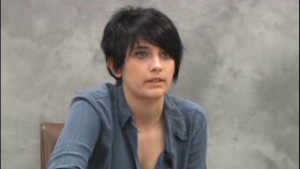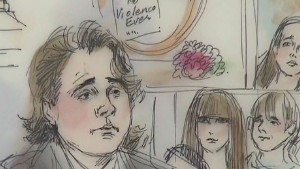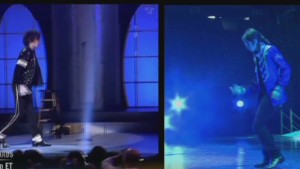- Michael Jackson died in a desperate search for sleep
- He told a nurse that propofol was the only cure for his insomnia
- A jury must decide if AEG Live contributed to his death by hiring Dr. Conrad Murray
- Jurors could conclude that Jackson shares blame with the concert promoter
Los Angeles (CNN) -- Michael Jackson suddenly awoke at 4:30 a.m. on April 19, 2009, stood on his bed and exclaimed "I told you I cannot sleep all night!"
Jackson's frustration, just as rehearsals for his comeback concerts were gearing up, marked the beginning of the end for the pop icon, a deterioration documented by e-mails, photographs and testimony presented in the wrongful death trial of concert promoter AEG Live.
Nurse Cherilyn Lee, who had been giving Jackson IV infusions of a cocktail of vitamins for two months to help him sleep, sat at his bedside. "It kind of scared me," Lee said. "It really startled me when he stared at me with his big brown eyes."
Jackson asked Lee to help him find an anesthesiologist to infuse him with the surgical anesthetic propofol because he was convinced it was the only cure for his insomnia, she testified.
 Michael Jackson doc: 'He wasn't faking'
Michael Jackson doc: 'He wasn't faking'
 Paris Jackson's deposition
Paris Jackson's deposition
 Prince Jackson testifies against AEG
Prince Jackson testifies against AEG
 Compare Michael Jackson in 2001 to 2009
Compare Michael Jackson in 2001 to 2009
Jackson had made the same request of Dr. Allan Metzger when the doctor, who had treated him for 26 years, visited his Los Angeles home a day earlier, according to Metzger's testimony.
Metzger and Lee testified that they refused, warning Jackson that it was unsafe to use the IV anesthetic outside of a hospital or clinic.
Jackson told Lee that doctors had assured him it was safe as long as he was properly monitored. She testified that she told Jackson that any doctor who would give him propofol at home didn't care about him and was just doing it for the money.
Jackson died 65 days later from an overdose of propofol, a drug that Dr. Conrad Murray told investigators he infused into Jackson almost every night for two months to put him to sleep.
Murray is a month away from being freed from jail after serving two years for an involuntary manslaughter conviction in Jackson's death.
Closing arguments begin Tuesday in the five-month-long trial to decide if AEG Live shares responsibility in Jackson's death for the negligent hiring, retention or supervision of Murray.
The 83 days of testimony that ended Friday included startling revelations about the pop icon's fatal search for sleep.
Burden of proof
Los Angeles Superior Court Judge Yvette Palazuelos instructed jurors Monday that Jackson's mother and three children have the burden of proving that their case is "more likely to be true than not true." Unlike in a criminal case, they do not have to prove it "beyond a reasonable doubt," she said. A verdict requires just nine of the 12 jurors to agree -- not a unanimous decision.
The Jacksons' lawsuit contends AEG Live is liable for damages in the singer's death because its executives hired Murray to serve as Jackson's personal physician for his "This Is It" tour and that they were negligent in hiring, retaining or supervising him.
Jurors will have a verdict form with 16 questions to answer during their deliberations. A "no" answer to any of the first five would end their deliberations and the trial immediately. Beyond that, they would decide what damages, if any, AEG Live would pay the Jacksons.
Question No. 1
Did AEG Live hire Murray?
Lawyers for the concert promoter argue that it was Jackson who chose and hired the doctor. Murray had treated Jackson and his children for minor illnesses for about three years while they were in Las Vegas. AEG Live Co-CEO Paul Gongaware began negotiations to hire Murray only at Jackson's insistence, they say.
A final contract between Murray and AEG Live -- with a third-party signature line for Jackson -- listed Murray's starting date as May 1, 2009. But it was not sent to Murray until just days before Jackson's death. Murray signed and returned it, but no AEG Live executive signed it after Jackson's death the next day. Neither Jackson, nor any of his representatives, ever saw the contract, according to testimony.
Jurors will have to decide if AEG Live's negotiations and actions, documented by several e-mails, constituted Murray's hiring in the absence of a signed contract.
Paul Gongaware, who was the top producer of Jackson's tour, wrote in an e-mail on May 6, 2009, that it was a "done deal" that Murray was being hired for $150,000 a month to serve as Jackson's full-time physician.
Murray sent an e-mail to AEG Live on May 15, 2009, saying he was "already fully engaged" in treating Jackson.
Jackson lawyers consider another Gongaware e-mail sent 11 days before Jackson's death to be a smoking gun to show that AEG Live considered Murray to be under their control, not Jackson's. "We want to remind (Murray) that it is AEG, not MJ, who is paying his salary. We want to remind him what is expected of him," the AEG Live co-CEO wrote.
Question No. 2
Was Murray unfit or incompetent to perform the work for which he was hired?
Murray practiced as an interventional cardiologist, which mostly involved placing catheters into the arteries of heart disease patients. Jackson had no known heart issues, which the coroner confirmed in his autopsy report. Jackson's chief medical problem was his insomnia, for which Murray had no special training.
Murray treated Jackson's insomnia with nightly infusions of propofol, a drug that is supposed to be administered only by an anesthesiologist or a nurse anesthetist under the supervision of a doctor. It was an approach to sleep medicine that is universally condemned after the singer's overdose death.
Murray's competence is also questioned by his decision not to use proper monitoring equipment that is standard when putting a patient into a drug-induced coma.
Jackson lawyers say that Murray's dire financial condition, combined with the high salary offered by AEG Live, added to his incompetence. He decided to breach his ethical responsibility to do no harm to his patient because he feared losing the job that offered to deliver him from a mountain of debt, they argue.
AEG Live says that Murray was never sued for malpractice and that he was licensed to practice medicine in four states.
Question No. 3
Did AEG Live know or should it have known that Murray was unfit or incompetent and that this unfitness or incompetence created a particular risk to others?
The Jacksons accuse AEG Live of failing to check Murray's background, which would have revealed he was deep in debt and desperately dependent on the $150,000 a month they agreed to pay him.
Two Los Angeles police detectives testified that they concluded Murray's financial woes were at the root of his motive in the involuntary manslaughter of Jackson. His Las Vegas home was facing foreclosure, he was $1 million in debt and he was behind on support payments for several children, they said. Their suspicions were raised when they read his contract, which said he could lose the lucrative job if the tour was postponed or canceled, they said.
Jackson lawyers argue that AEG Live should have ordered a credit check for Murray because of the sensitive job he was being given. AEG Live lawyers say their executives could not have anticipated that his financial circumstances were relevant to his competency as a doctor.
A music industry veteran hired as an expert witness by Jackson lawyers testified that AEG Live's agreement with Murray set up an "egregious" conflict of interest in which the physician was beholden to the company and himself before Jackson's interests.
It was "not unlike the team doctor for a football team, where the quarterback is injured and the doctor comes to the medical conclusion that the quarterback should be taken out of the game for a period of weeks, but the team doesn't want him out," said David Berman, who once headed Capitol Records. "There is an inherent conflict."
It was the doctor's responsibility, not the concert promoter's, to avoid a medical conflict of interest, AEG Live lawyers argue.
They say their executives had no way of knowing about the dangerous propofol treatments Murray was giving Jackson in the privacy of his bedroom. They presented testimony from a parade of former Jackson doctors and Jackson's youngest brother, Randy, in an effort to show that the pop icon was a drug addict who kept his use of prescription medicines private.
But two doctors called by Jackson lawyers testified they had discussed Jackson's tendency to abuse painkillers, while on tour, with Paul Gongaware when he worked as Jackson's tour manager in the 1990s.
Dr. Metzger testified that he had discussed Jackson's problem with insomnia to Gongaware.
Jackson's former wife Debbie Rowe testified that Metzger arranged for anesthesiologists in Germany to treat Jackson's insomnia between concerts in Munich with propofol in a hotel room in 1997. Gongaware was the tour manager then.
Jurors will have to decide if that is enough evidence to prove that it's more likely true than not true that AEG Live executives should have known that Murray might be using dangerous treatments for Jackson's insomnia as he prepared for his 2009 tour.
Question No. 4
Did Murray's unfitness or incompetence harm Michael Jackson and the Jackson plaintiffs?
If jurors get this far down the verdict form, it means they've answered "yes" to the previous three questions. Since they would have already decided Murray was unfit or incompetent, this question may not take much of their time.
Jackson died of a propofol overdose while under Murray's care, according to the autopsy report. It was not disputed at the trial. Evidence that led to Murray's involuntary manslaughter conviction two years ago was presented to this civil jury.
AEG Live challenged the estimates of economic harm cause by Jackson's death, but jurors saw plenty of evidence of the harm that the plaintiffs -- his mother and three children -- suffered by the loss of a son and a father.
Question No. 5
Was AEG Live's negligence in hiring, supervising or retaining Murray a substantial factor in causing Michael Jackson and the Jackson plaintiffs' harm?
AEG Live's negligence allegedly included executives ignoring a series of red flags that Jackson lawyers say should have alerted them that Murray was a danger to Jackson.
Murray was kept on the job despite warning signs that Jackson's health had deteriorated by the middle of June to the point that he could not remember song lyrics or perform trademark dance moves; he was hearing voices and talking to himself; and he was suffering chills during summertime rehearsals, Jackson lawyers say.
Assistant show director Alif Sankey testified that she screamed at show director Kenny Ortega in a phone call after a June 19 rehearsal, begging that he get help for Jackson. "I kept saying that 'Michael is dying, he's dying, he's leaving us, he needs to be put in a hospital,' " Sankey said. " 'Please do something. Please, please.' I kept saying that. I asked him why no one had seen what I had seen. He said he didn't know."
Jackson died a few days later.
Karen Faye, the pop singer's makeup artist, said Jackson seemed "frightened" and was talking to himself, repeating "the same thing over and over again" at that rehearsal.
Tour production manager John "Bugzee" Hougdahl sent an e-mail to AEG Live CEO Randy Phillips the next morning. "I have watched him deteriorate in front of my eyes over the last 8 weeks. He was able to do multiple 360 spins back in April. He'd fall on his ass if he tried now," Hougdahl wrote. "He was a basket case and Kenny (Ortega) was concerned he would embarrass himself on stage, or worse yet -- get hurt. The company is rehearsing right now, but the DOUBT is pervasive."
Ortega sounded a warning the same day in an e-mail to Phillips describing "strong signs of paranoia, anxiety and obsessive-like behavior" from Jackson. "I think the very best thing we can do is get a top psychiatrist to evaluate him ASAP."
Ortega testified that with just a dozen days left for rehearsals before the touring company moved to London for the opening, he "felt that we should stop" the production on June 19, but he was "torn because I did not want to break Michael's heart."
Instead of stopping the rehearsals, getting a another doctor to check Jackson or replace Murray, Phillips met with Murray and put him in charge of making sure Jackson missed no more rehearsals.
Phillips sent an e-mail to Ortega after the meeting saying he had confidence in Murray, "who I am gaining immense respect for as I get to deal with him more. This doctor is extremely successful (we check everyone out) and does not need this gig, so he (is) totally unbiased and ethical."
AEG Live says that Jackson appeared much better on June 23 and 24, the rehearsals that are seen in the "This Is It" documentary. Jackson died on the morning of June 25.
Questions No. 6-13
If jurors get to question six, it means they've decided AEG Live is liable in Jackson's death. The next eight questions would decide a dollar figure for the economic and noneconomic damages suffered by his mother and children.
California law allows Jackson's heirs to sue for the lost earnings capacity -- the amount of money he could reasonably be expected to earn had he not died on June 25, 2009. Since Jackson was arguably one of the most successful entertainers in history, the damage amount could be enormous.
Contrary to what many media outlets have reported, the Jacksons never asked for $40 billion. In fact, by law the complaint does not state an amount. It is something that the lawyers may argue in court based on testimony and evidence presented in the trial.
Even though AEG Live sold out Jackson's 50 London shows in record time and their executives had placed a big bet on Jackson's earning power, their lawyers worked to convince jurors that Jackson was a has-been with limited future earning potential. One of their experts testified that he believed that Jackson might not have earned another dime in his career.
Eric Briggs based his conclusion on testimony by a Jackson sleep expert that the singer was near death from lack of sleep, even if he had not overdosed on propofol. Harvard sleep expert Dr. Charles Czeisler testified he believed that Murray's infusions of propofol robbed Jackson of essential REM sleep that would have eventually proved fatal unless stopped. The drug interrupts crucial REM sleep cycles, depriving the brain of real rest and repair, the expert said.
Jackson lawyers scoffed at Briggs' use of that theory, arguing that AEG Live would still be liable for that eventual death.
Briggs also questioned if Jackson would have been able to complete another world tour because of his health and poor demand for tickets. He testified that "significantly negative headlines, drug abuse and other issues" had ruined Jackson's ability to earn endorsement and sponsorship money.
A Jackson expert concluded that he was reasonably certain the pop icon would have earned $1.5 billion touring the world over the next several years had he not died. He based his estimates on AEG Live's own projections developed when its executives were planning to take Jackson on tour in the year before his death.
Jackson lawyers might suggest to jurors that they add additional damages based on what they think the entertainer might have earned if he had begun making films after completing his world tour. His son Prince and nephew Taj Jackson both testified about his plans to conquer the movie world next.
Jurors would also place a dollar value on the noneconomic damages suffered by Jackson's mother and three children. The jury did hear during the trial that daughter Paris Jackson, 15, tried to kill herself in June. It is not clear if Jackson lawyer Brian Panish will point to Paris' emotional problems, which the lawyers have blamed on the loss of her father, when he argues for noneconomic damages.
Questions No. 14-16
The amount of damages calculated by the jury could be significantly reduced when they reach the last three questions on their verdict form. These ask them to decide how much, if any, Michael Jackson's own negligence was a factor in his death.
Panish has stated publicly that Jackson shares some of the liability for his own demise, but he has not suggested a percentage. Jurors will be asked to assign a percentage of blame to Jackson and to AEG Live. The concert promoter would then be ordered to pay the percentage of the damages that equals its share of blame as determined by the jury.
Deliberations are expected to begin Thursday afternoon.